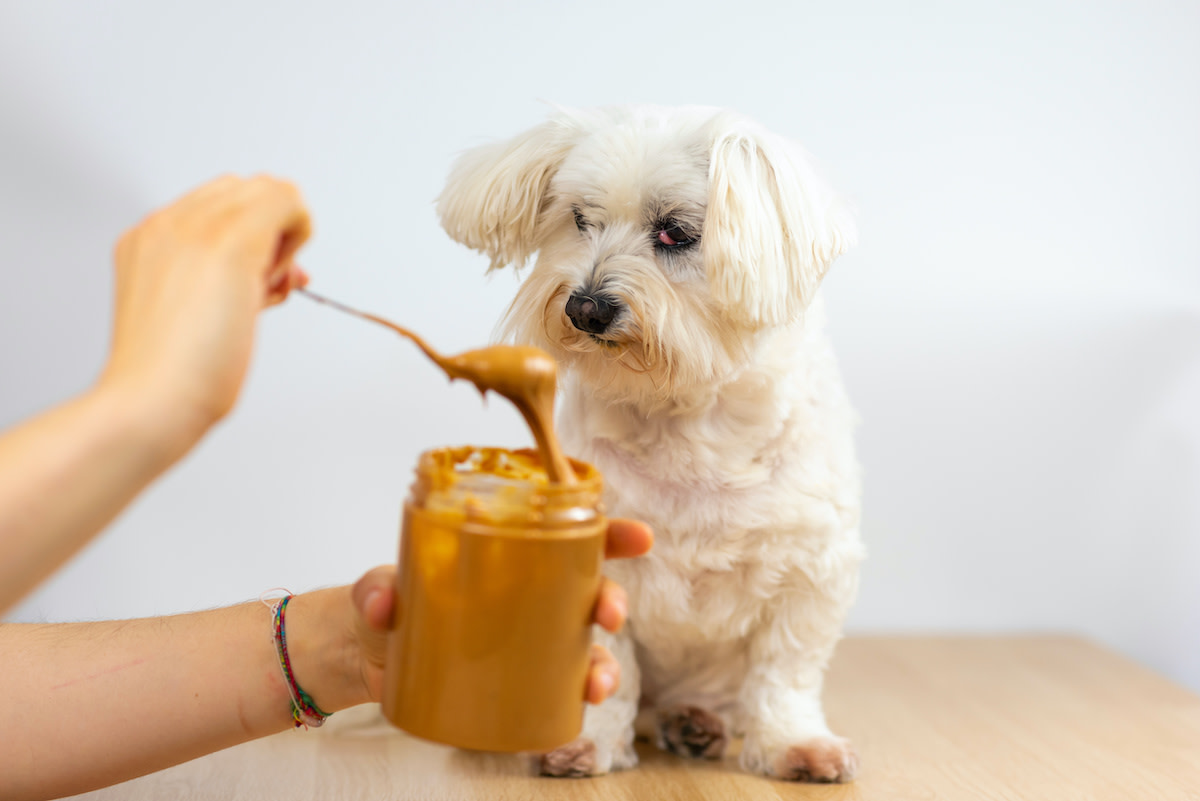Can Dogs Eat Peanut Butter? Choosing Dog-Safe Peanut Butter
Written by MasterClass
Last updated: Mar 22, 2022 • 4 min read
Pet owners rightfully question what human foods their dogs can eat. You might be happy to know dogs can eat peanut butter within certain parameters. Both crunchy and creamy peanut butter can serve as a supplement to your dog’s diet so long as you keep an eye on the ingredients and feed your dog the tasty treat in moderation.
Learn From the Best
Can Dogs Eat Peanut Butter?
Dogs can eat peanut butter so long as the recipe doesn’t contain xylitol (an artificial sweetener and sugar substitute) or other ingredients that might cause an allergic reaction. Additionally, you should give them peanut butter in moderation—too much poses a problem for pet health in terms of both stomach upset in the short run and obesity in the long run.
Although dogs can eat peanut butter, they cannot eat all nut butters. For instance, dogs can tolerate cashews but not macadamia nuts. Always check with your vet or another credible source before feeding your pet anything out of the ordinary.
Is Peanut Butter Good for Dogs?
In addition to being a tasty treat for dogs, peanut butter can prove to be a welcome supplement to their overall dietary needs. There are even special kinds of peanut butter treats made especially for dogs. Peanut butter is full of healthy fats, fatty acids, proteins, niacin, vitamin E, and other ingredients that will bolster your dog’s energy and keep their bodily systems working optimally. Still, only serve it as an occasional treat—too much peanut butter could cause unnecessary weight gain and subsequent health issues.
7 Tips for Feeding Your Dog Peanut Butter Safely
Dog owners should keep these tips in mind before feeding a dog peanut butter:
- 1. Ask your vet. Your vet has a good understanding of your dog’s health and needs. Ask them whether they think peanut butter is a good idea for your pet. See if they can run tests to predict any allergic reactions. They can also tell you if your dog needs to lose weight, which could be a sign to go easy on peanut butter as it’s quite a high-fat snack.
- 2. Check for xylitol. This artificial sweetener is highly toxic to dogs and can turn up in various types of peanut butter. It’s also common in chewing gum. Xylitol causes a sudden decrease in canine blood sugar levels that can lead to life-threatening hypoglycemia, pancreatitis, or liver failure. If your dog accidentally consumes xylitol, you can rub maple or corn syrup on their gums to stabilize blood sugar levels temporarily on your way to the vet or animal hospital. Still, keep in mind that xylitol-free peanut butter is almost always safe for dogs, and there are plenty of brands that offer products without xylitol.
- 3. Feed in moderation. Feeding your dog a large amount of peanut butter every day can lead to weight gain and subsequent health issues. It’s better to present peanut butter as an occasional treat or a supplement to your dog’s daily calorie intake than a steady component of their dog food. As a general rule, both large and small dogs should also only eat peanut butter in small amounts. A tablespoon or less should be fine, but more can sometimes cause mild stomach upset.
- 4. Find tailor-made dog treats. You can give your dog a dollop of peanut butter straight from the jar or a treat specifically for dogs that already contains peanut butter. These treats should take into account common canine food allergies and thus be free of xylitol and other adverse ingredients; however, it’s good practice to be vigilant when it comes to anything you’re feeding your pet.
- 5. Look for simple recipes. Sugar-free and unsalted peanut butter brands comprise the best peanut butter for dogs in general. The more basic the ingredients, the more unlikely the recipe will cause any minor or major issues. Opt for an all-natural ingredient list over peanut butters with added sugar, additives, and preservatives to keep things as dog-safe as possible. Try to find an alternative to brands with hydrogenated oils, too—for example, some peanut butters include palm oil and coconut oil, but both can be upsetting to dogs’ stomachs.
- 6. Make your own peanut butter. As a pet owner, you can always make your own creamy or crunchy peanut butter instead of buying some from the store. This is one way to ensure your homemade peanut butter is free from sugars, sweeteners, and preservatives that might upset your dog’s stomach or cause any other issues.
- 7. Monitor your dog afterward. It’s important to always keep an eye on your dog’s health, especially after introducing something new to their diet. Take a proactive approach—for instance, have your vet test your pooch for peanut allergies. Still, even if you check everything in advance and serve natural peanut butter to your dog, they might get a mildly upset stomach for one reason or another. In this case, be there to comfort your pet and take them to the vet if they are in distress, then opt for alternative treats in the future.
Before Sharing With Your Pooch
Certain human foods can cause adverse reactions in canines, so always consult your veterinarian to determine whether it is safe to add these foods to your pet’s diet. This article is for educational and informational purposes and is not a substitute for medical or dietary advice.
Want to Learn More About Training the Goodest Boy or Girl?
Your dream of having a dog who understands words like “sit,” “stay,” “down,” and—crucially— “no” is just a MasterClass Annual Membership away. The only things you’ll need to train up a well-behaved pup are your laptop, a big bag of treats, and our exclusive instructional videos from superstar animal trainer Brandon McMillan.
